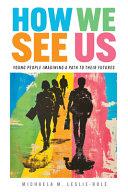[Read] PDF/Book How We See Us: Young People Imagining a Path to Their Futures (Work and Learning Series)Michaela M Leslie-Rule

Ebook PDF How We See Us: Young People Imagining a Path to Their Futures (Work and Learning Series) | EBOOK ONLINE DOWNLOAD
If you want to download free Ebook, you are in the right place to download Ebook. Ebook/PDF How We See Us: Young People Imagining a Path to Their Futures (Work and Learning Series) DOWNLOAD in English is available for free here
[Download] Link : [Downlload Now] How We See Us: Young People Imagining a Path to Their Futures (Work and Learning Series)
Read More : [Read Now] How We See Us: Young People Imagining a Path to Their Futures (Work and Learning Series)
Description
A compelling appeal to center the perspectives of young people to support them in mapping pathways to future success In How We See Us, Michaela Leslie-Rule amplifies the voices of young people approaching adulthood as they consider their experiences, needs, and goals for their education, early careers, and lives. Leslie-Rule encourages adults who support young people to listen more closely to youth voices so that their perspectives are centered in interventions made on their behalf. Based on the findings of a research project of remarkable breadth
and scale, with in-depth interviews, surveys, and focus groups of nearly 4,000 students from Black and Hispanic communities and low-income households in both urban and rural regions across the United States, the book finds thoughtful self-reflection and an optimistic mindset in the stories of the youths' successes and challenges. The rich accounts of how they experience their identities, communities, education, and employment refute dominant narratives that so often frame their abilities in terms of deficits and that suggest that young people, and students of color especially, live in a perpetual state of crisis. Leslie-Rule advocates for listening more deeply to young people and provides a framework, as well as tools, prompts, worksheets, and other resources, to improve practice. Such consideration, she argues, enables educators, policymakers, and researchers to better address the barriers students experience in building and navigating pathways to education, career, and adulthood.
